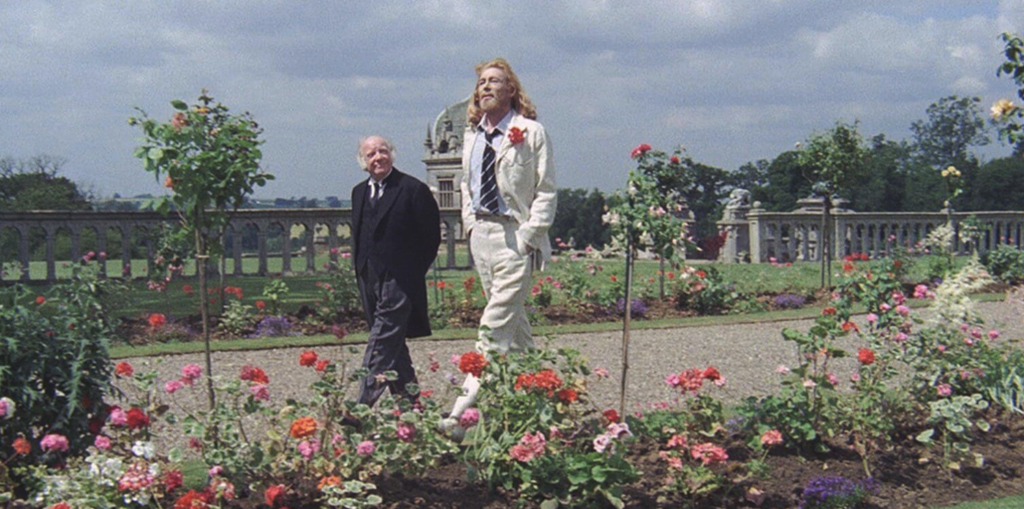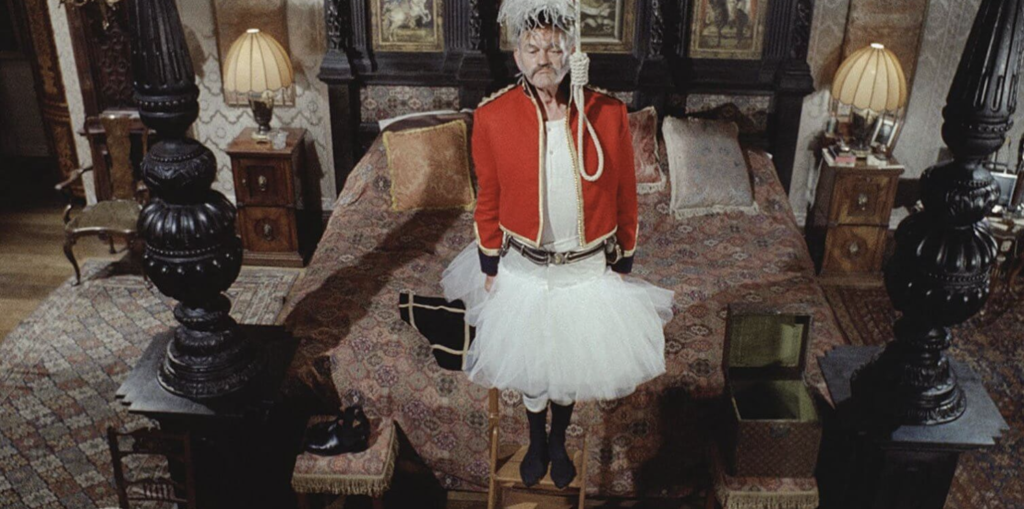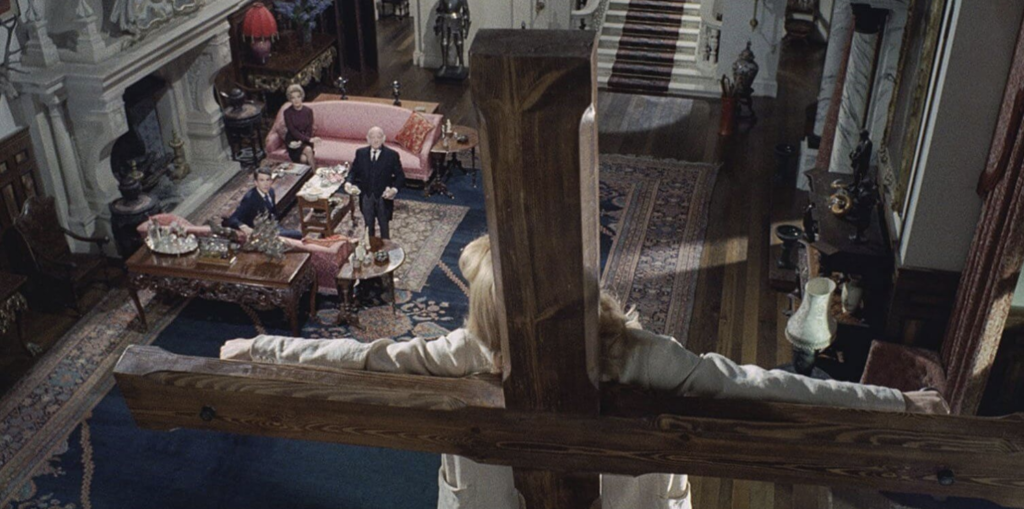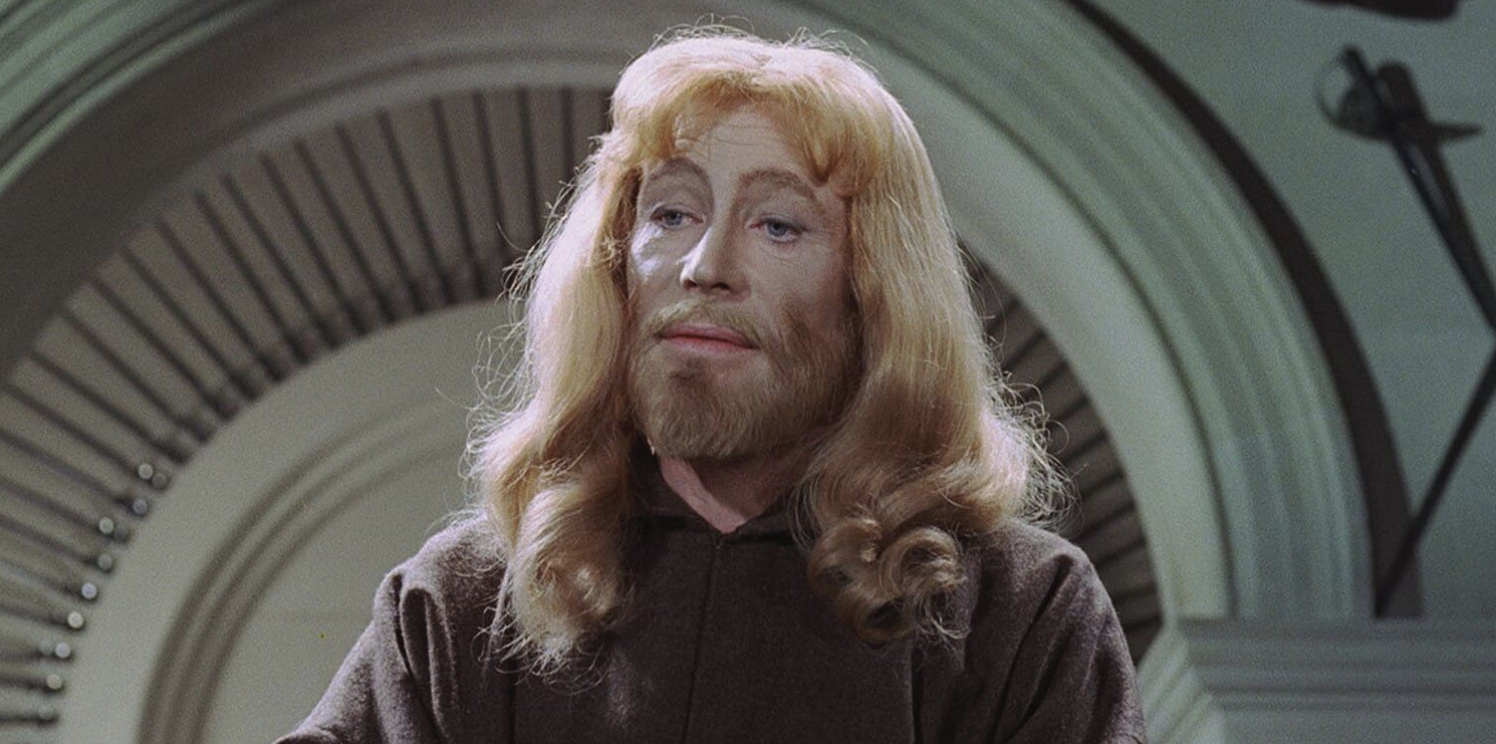| Yuval Klein |

The Ruling Class plays at the Trylon Cinema from Sunday, July 9th, through Tuesday, July 11th. Visit trylon.org for tickets and more information.
This essay contains a brief discussion of suicide and mental health.
The Ruling Class portrays England as a shallow, decadent, and incorrigible institution hiding behind the facade of modernization. Oscillating between a traditional narrative and musical, the theatrical film satirizes British aristocracy and Christianity in boldly sacrilegious images. Just like in the film’s worthy contemporary, Monty Python’s Flying Circus, Old England is satirized to its core. The film is adapted from Peter Barnes’s groundbreaking play of the same name, which tinkers with the classic techniques of British playwrights in a farce manner. The erudition of literature and culture is utilized in a manner that is unique and outrageous.
At the very beginning of the film, the father is introduced in the Society of St. George. The group of old and monotonously dressed men was asked to “pray silence” for him. The word “pray” begins the film with a basis of irony. The speech that he proceeds to give is in favor of the death penalty. Once again, there is a sort of ironic power surrounding him. He is a character that feels entitled to impose death on mortals, as though he is a deity imposing divine retribution. Then, God Save the Queen plays over the titles. Once again, there is a close relationship between aristocracy and God, as though these people are deities. The silver platter is a common symbol of privilege, and so it is ironic that the old Earl was given on a silver platter the rope with which it seemed at first that he would commit suicide. We are surprised when he then asks for a good breakfast the next day (and an English one, for that matter). It is as though he is immortal, as though he cannot die. When the stool on which he stands with the rope around his neck accidentally tips over, there seems to be an allegory in this. This stool is what stopped him from being mortal, and kept him in the top rung of society. It is like an angel falling from grace. He is not, in fact, a deity imposing death on sinners, but rather a mortal being.

Aside from the writing, Peter O’Toole is the most substantial catalyst of the hysteria which textures the film. His character, Jack Gurney, assumes his father’s earldom after he dies suddenly, surprising and irritating the rest of his family. Jack is a schizophrenic who believes himself to be God and addresses people with excessively fanciful and pathos-inducing sentences. When asked why he believes himself to be the god of the New Testament, he answers “When I pray to him, I find that I am talking to myself.” O’Toole portrays all of the eccentricities of his character with a masterful intensity that is at times airy, at times frightening, and at times comical.
His disturbing vanity manifests itself in brutal corporeal punishment that was and is shocking to some. The sacrilege and cynicism are hysterical when portrayed theatrically and at times, through a traditional musical. It is a film that can only ever be a cult classic because it is too perverse and cutting-edge to be more broadly accepted. The vulgarity led to it being unfairly rated X in the U.K.

Jack has a more exaggerated grandeur than other members of the aristocracy, but there is nonetheless a resemblance in their delusions, that of vanity to an absurd extent. The idea of superiority that finds itself entangled throughout the rungs of classism is proclaimed to be unjustified, and in all of the tangential peculiarities, the result is a scathing argument to this point. The way in which one accumulates power is satirized most analogously in Being There (1979), although Jack’s messiah complex is in stark contrast to the affable protagonist of the other film.
Another way of seeing Jack is as a proletariat outsider rising above the establishment (at least in much of the film). The family feels entitled to the position and power that he has salvaged. His “love all” ideas do not align with the classism which the family prioritizes. Of course, the way in which he conducts himself is not such. He imposes death on people just as his father tried to do at the beginning of the film. He believes that he is superior to others to a large extent. Jack and his father clearly both have the arrogance of a deity, but the empty ideas that Jack proclaims are very different from his conservative father. Classism is impossible to ignore in a film with a title that is so commonly used in Marxist theory.

Beyond satirizing British society (in a way that is somewhat antiquated and somewhat timeless), there is also a larger scope to the commentary. For example, the plot is reminiscent of the classic stories of Joan of Arc or Socrates. The prophetic inner voices of Jack belong to Socrates, General Charles George Gordon, and Timothy Leary (an eclectic bunch). The smugness that is especially prevalent in those privileged in their economic or political status is a common source of ridicule in satire. It is a timeless subject in comedy, and one that is cunningly portrayed in the writing of Peter Barnes. The fact that the butler addresses the delusional, aristocratic pseudo-messiah as “your lordship” makes the direction to which the character was led to be more plausible and ironic, rather than just bizarre and peculiar. The ruling class is treated with a boundless reverence that is more similar to a messiah than the people that they really are. Although much of the film is absurd, there is an underlying truth to the film.
Edited by Olga Tchepikova-Treon
